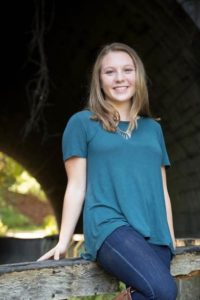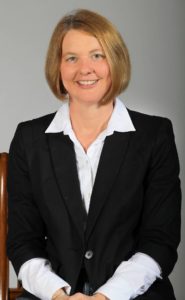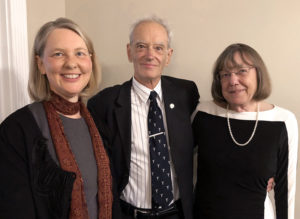Allegheny College student Sarah Shapley will participate in a Fulbright Summer Institute to study in Wales in the United Kingdom through one of the most prestigious and selective summer scholarship programs operating worldwide.

Shapley, a rising junior, is from Fairport in suburban Rochester, New York. She is a major in international studies with a minor in women’s, gender, and sexuality studies.
Beginning in mid-June, Shapley will participate in a three-week summer program to study identity and nationhood in Wales at Aberystwyth University. The students she will be among will be able to discover the National Library of Wales, one of the U.K.’s five copyright libraries; learn some of the Welsh language; participate in roundtable discussions with key figures in Welsh politics; and explore the countryside of mid-Wales, including a United Nations Educational, Scientific and Cultural Organization World Heritage site.
“Upon learning I received the placement, I was incredibly excited and thankful to have received an opportunity that would enrich both my academic and personal experience,” Shapley said. “As a Fulbright summer program participant, I hope to learn more about the Welsh language and culture, as well as delve into and engage in a topic of study that interests me.
“I am also excited to meet new people and be immersed in a new culture,” she said. “I hope this work will enable me to have a deeper understanding of the concept of identity and nationhood, so that in the future I can apply this new understanding to whatever work I end up doing.”
The U.S.-U.K. Fulbright Commission is a bilateral, transatlantic scholarship program, offering awards and summer programs for study or research in any field at any accredited university in the United States or United Kingdom.
The commission selects participants through a rigorous application and interview process. In making these awards, the commission looks not only for academic excellence but a focused application, a range of extracurricular and community activities, demonstrated ambassadorial skills, a desire to further the Fulbright Program, and a plan to give back to the recipient’s home country upon returning.
“I think the fact that Sarah is the third student in a row that we have sent to participate in this program says something about the kinds of things our students are doing at Allegheny,” said Patrick Jackson, director of fellowship advising at the College.
“In a supremely competitive field, they stand out,” Jackson said. “The Fulbright Summer Institute in the U.K. is one of the most competitive fellowships that first- and second-year students can pursue and our continued winning of them is a testament to our young students’ potential. I think Sarah is going to come back from her summer in the U.K. with some new and interesting perspectives to share. If the experiences of our previous winners is any indication, she’ll also come back with a much better idea of how she wants to proceed with her education here.”
Each year, the U.S.-U.K. Fulbright Commission supports around 60 U.K. and U.S. undergraduate students to undertake a demanding academic and cultural summer program at leading institutions in the U.S. and U.K. Fulbright Summer Institutes cover all participant costs. In addition, Fulbright summer participants receive a distinctive support and cultural education program including visa processing, a comprehensive pre-departure orientation, enrichment opportunities in country, a re-entry session and the opportunity to join alumni networks.
The U.S.-U.K. Fulbright Commission is part of the Fulbright program conceived by Senator J. William Fulbright in the aftermath of World War II to promote leadership, learning and empathy between nations through educational exchange. Award recipients and summer program participants will be the future leaders for tomorrow and support the “special relationship” between the U.S. and U.K.

